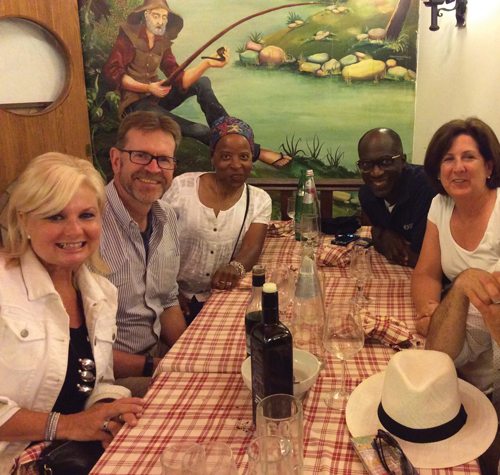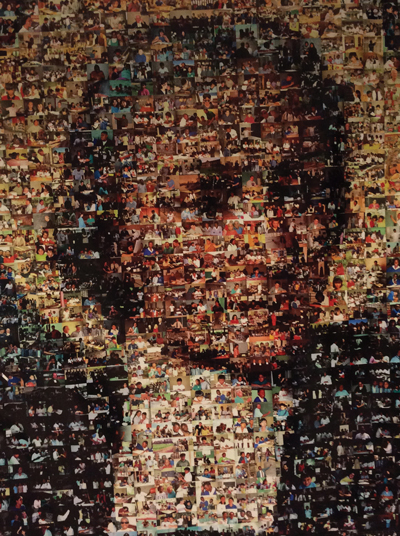The global Lasallian network is vast, with 976 schools including more than 60 universities, and more than 961,000 students worldwide. Each works tirelessly to fulfill and spread the Lasallian mission, bestowed by St. John Baptist de La Salle more than 300 years ago, around the world.
In a rapidly changing world, Brother Ernest Miller, FSC, D. Min., M.A.’95, Vice President for Mission recognizes the need for this to change. “We need to get out of our humble bubble and better showcase ourselves,” he says. The International Leadership Program is one of multiple programs in place to do just that. And for two weeks every summer, the International Association of Lasallian Universities (IALU) brings faculty and staff from Lasallian universities around the globe together in Rome for an immersion experience that provides a deeper introduction into the Lasallian charism and mission. This summer, La Salle sent Rhonda Hazell, DPM, assistant professor of biology, Bill Price, Ph.D, professor and Chair of the Department of Chemistry and Biochemistry, MarySheila E. McDonald, J.D., Dean of the School of Business, and Stephanie Pricken, Vice President for Finance and Administration for the Leadership Program experience. But, as all things La Salle go,what they experienced was so much more.
“Our mission goes well beyond Catholic teachings… We need to be bold and create a new future, not just roll with the changing times.” -Bill Price, Ph.D., Professor and Chair of the Department of Chemistry and Biochemistry
Participants adhere to a rigorous schedule over two weeks, attending workshops, learning about Lasallian heritage, participating in daily prayer, visiting historical sites, and attending lectures discussing how to advance the Lasallian mission. McDonald was blown away by the things that she learned, both about St. John Baptist de La Salle, and the work of the Christian Brothers around the globe.
“Some of this stuff that they’re doing,” she says, “it’s enough to make you cry. It’s an honor and a privilege to be asked to go.”
“Programs like this instill a sense of urgency to [promote La Salle’s mission,]” says Price. “Collaborating with colleagues from universities in other countries made me realize that there is a pragmatism, a logic, and an ethic to being Lasallian.” He adds, “Many participants in Rome were from countries with significantly less to work with than we have, but they make it work.”
 Hazell mirrored the same sentiment. “The fact that I was able to intimately spend time with 57 other people who I did not know from 27 Lasallian universities is pretty powerful,” she said. “It was a great experience to have the time to process and reflect on the Lasallian mission and how I can better play a role in it… I was transformed by the experience.”
Hazell mirrored the same sentiment. “The fact that I was able to intimately spend time with 57 other people who I did not know from 27 Lasallian universities is pretty powerful,” she said. “It was a great experience to have the time to process and reflect on the Lasallian mission and how I can better play a role in it… I was transformed by the experience.”
 They were also able to see Pope Francis who blessed a member of their group who was getting engaged. “[That] was certainly a highlight,” Price says. “We all got goosebumps at that moment,” Hazell says. It was so beautiful and so special!”
They were also able to see Pope Francis who blessed a member of their group who was getting engaged. “[That] was certainly a highlight,” Price says. “We all got goosebumps at that moment,” Hazell says. It was so beautiful and so special!”
Br. Ernest, who stood in as an observer for one week of the trip, says the reason these programs are important is because, “we don’t get the Lasallian mission through osmosis.”The Leadership Program helps, he says, “strengthen Lasallian educators and leaders—and all of us here at La Salle are educators—to make them better and stronger and give a better understanding of our founding story…and how we keep that vision and mission alive today.”
He further adds the importance of the immeasurable ripple effects of these encounters. “I’ve witnessed faculty, staff, and administrators from around the world—complete strangers—meet and collaborate to work on things like research projects,” he says. “There is wide impact. For sure.”
Hazell is one of many who experienced serendipitous encounters. “I actually met a woman who had done the same mission trip that I did to Haiti, worked with the same people, knew the same people, but we had never met before,” she says. “She started showing me pictures and I said, ‘hey that’s my clinic!’…We started collaborating, and we emailed our friend in Haiti and now we’re going to do some work together. That was just amazing.”
These are the stories that are changing lives and, furthermore, the stories that need to be told. But how do we tell our story in the 21st century? There are many ways, but for those with a renewed sense of the Lasallian mission, the answers are clearer than ever.
“Our mission goes well beyond Catholic teachings,” says Price.
“Indeed, they are teachings of justice, transformation, reflection, and zealousness. We need to be bold and create a new future, not just roll with the changing times.”
The importance of programs for mission and education formation in helping to define La Salle’s continued legacy can’t be over-emphasized. “You know how you get your cup filled when you’re thirsty” Hazell asks. “This was like that. I got my cup filled and I feel refreshed and now I can do more.”
